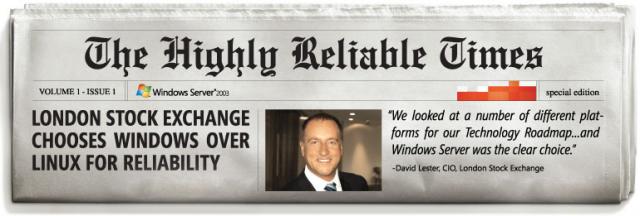
According to several media reports two weeks ago, the new head of the London Stock Exchange intends to dump TradElect, their flagship system introduced two years ago for a cool £40 million investment.
Ever since the system crashed last September and the LSE's share price tanked, we've all been wondering what would happen, especially as the new exchanges like Chi-x and Turquoise claim millisecond latency compared to LSE's aspirations to get theirs down to six or less.
Latency is critical as being slower means losing trade executions means losing liquidity, revenues, margin and more.
Seeing the murmur about the system dump (!) did hit my radar but I assumed it was down to a view of how to compete with Chi-x, rather than necessarily the core technologies being flawed.
However, the core technologies are the flaw if LSE is to compete with Chi-x, and there's growing evidence in the technical press that the issues boil down to TradElect being built on Microsoft platforms. In particular, there's this key commentary from Computerworld’s Blog:
“Anyone who was ever fool enough to believe that Microsoft software was good enough to be used for a mission-critical operation had their face slapped this September when the LSE (London Stock Exchange)'s Windows-based TradElect system brought the market to a standstill for almost an entire day. While the LSE denied that the collapse was TradElect's fault, they also refused to explain what the problem really was. Sources at the LSE tell me to this day that the problem was with TradElect.
“Since then, the CEO that brought TradElect to the LSE, Clara Furse, has left without saying why she was leaving. Sources in the City-London's equivalent of New York City's Wall Street--tell me that TradElect's failure was the final straw for her tenure. The new CEO, Xavier Rolet, is reported to have immediately decided to put an end to TradElect.
“TradElect runs on HP ProLiant servers running, in turn, Windows Server 2003. The TradElect software itself is a custom blend of C# and .NET programs, which was created by Microsoft and Accenture, the global consulting firm. On the back-end, it relied on Microsoft SQL Server 2000. Its goal was to maintain sub-ten millisecond response times, real-time system speeds, for stock trades.
“It never, ever came close to achieving these performance goals. Worse still, the LSE's competition, such as its main rival Chi-X with its MarketPrizm trading platform software, was able to deliver that level of performance and in general it was running rings about TradElect. Three guesses what MarketPrizm runs on and the first two don't count. The answer is Linux.
“It's not often that you see a major company dump its infrastructure software the way the LSE is about to do. But, then, it's not often you see enterprise software fail quite so badly and publicly as was the case with the LSE. I can only wonder how many other Windows enterprise software failures are kept hidden away within IT departments by companies unwilling to reveal just how foolish their decisions to rely on archaic, cranky Windows software solutions have proven to be.
“I'm sure the LSE management couldn't tell Linux from Windows without a techie at hand. They can tell, however, when their business comes to a complete stop in front of the entire world.
“So, might I suggest to the LSE that they consider Linux as the foundation for their next stock software infrastructure? After all, besides working well for Chi-X, Linux seems to be doing quite nicely for the CME (Chicago Mercantile Exchange), the NYSE (New York Stock Exchange), etc., etc.”
The wonders of latency, ay?
So why am I picking up on this story two weeks late?
Because there an interesting 280+ comments on this article, and so I’ve picked a few choice comments.
Comment #1:
I'd like to pick up on a couple of factual inaccuracies in the article:
"...it relied on Microsoft SQL Server 2000"
The TradElect platform has been using SQL Server 2005 since early last year.
"... goal was to maintain sub-ten millisecond response times...never, ever came close to achieving these performance goals..."
The platform currently has an average response time of around 3ms - as measured externally, in production, on a network tap.
Comment #2
As the article says, "created by Microsoft and Accenture". Microsoft uses the LSE implementation as a poster child for successful, demanding enterprise deployments of Microsoft products. Looks like this child is going to be their red-headed step child, and soon to be orphaned.

Comment #3:
From a Microsoft official case study (Download Case Study):
"In the development, roll-out, and implementation processes, Microsoft worked closely with the London Stock Exchange to ensure not only that they understood their immediate requirements, but that the solution fitted their long-term business plans as specified in the TRM project."Robin Paine, Chief Technical Officer at the Exchange, says: ‘The London Stock Exchange was looking for a responsive partner to engage across all phases o
f the Technology Roadmap programme. The collaborative approach Microsoft offered made it an ideal choice.’"
This looks like a bit of a public embarrassment if LSE does dump TradElect, not only for them but also for Microsoft and Accenture.
Doh!
Chris M Skinner
Chris Skinner is best known as an independent commentator on the financial markets through his blog, TheFinanser.com, as author of the bestselling book Digital Bank, and Chair of the European networking forum the Financial Services Club. He has been voted one of the most influential people in banking by The Financial Brand (as well as one of the best blogs), a FinTech Titan (Next Bank), one of the Fintech Leaders you need to follow (City AM, Deluxe and Jax Finance), as well as one of the Top 40 most influential people in financial technology by the Wall Street Journal's Financial News. To learn more click here...

